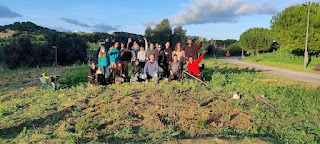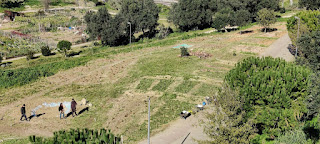URBEM is an NGO based in Lisbon, which aims to awaken citizens living in cities to Nature, through the conversion of spaces little used or with low biodiversity, into miniforests or fast-forests. Using the scientifically proven method of the Japanese botanist Akira Miyawaki, who privileges the introduction of endemic native species of low maintenance, we seek to involve the local community to carry out the numerous tasks of planting and maintaining each of these spaces.
Equally important are the educational and cultural taskspromoted around these spaces, with the aim of sensitizing the various age groups of the community on various themes related to nature.
At the moment URBEM is responsible for two fast-forests in Lisbon - Parque da Montanha in Bela vista - in partnerships with the Lisbon City Council and the European projects CONEXUS and LIFE-LUNGs.
In addition to these initiatives, the implementation of more miniforests is planned in 2023 - 2024, partnering not only with the Lisbon City Council but also with Parish Councils, and some Private and Public Entities. These partnerships have proven to be decisive for the success of the project.
We have planted close to 1,500m2 (with a density of 3 species per square meter), with the indispensable/invaluable help of about 800 volunteers from diverse backgrounds (students, children, scouts, pensioners/retirees, digital nomads, travelers, the business professionals, partners, and community members, etc...).
I interviewed one of the responsible people for the project and I would like to share our conversation.
-What is your name?
My name is Rita Barrela.
-What do you do in URBEM (position)?
I started in URBEM as a volunteer. URBEM started to build its first urban forest in Parque da Bela Vista in Lisbon in 2021 and another larger one in 2022, this one is near the place I live. Actually I can see the forest from my window. I saw a lot of people working and planting there so I went to check what it was. Everyone was basically foreigners except the biologist, he is Portuguese. After one or two Saturdays as volunteers (my husband and I) we started to get to know the project leaders (Sasi from Sri Lanka and Fábio from Italy) and we were invited to the Leaders Council. I’m now part of the Leaders Council and I’m in charge of communication with the community.
-What led you to be part of URBEM?
I’ve always liked projects related to the environment and I really like outdoors activities and meet people that share the same feeling. I’ve been a volunteer since 2008 and I’m a part of the ONG Brigada do Mar that cleans the beaches. So, creating urban forests that involve the local communities in a time when people try to mitigate climate change and turning them into communal outdoor spaces, provides all the conditions for me to want and enjoy doingit.
-What is your goal as an organization?
Our goal is to create urban forests of small dimensions (300 m2) near places lacking green spaces or inside green spaces without trees; the creation and maintenance of these forests involve local communities. This way we fight two problems: the climate change and the strong deforestation that we have been seeing in the cities and, at the same time, the issue of social isolation and sedentary lifestyle. URBEM was created during the pandemic (2021) by two digital nomads who felt extremely isolated in Lisbon. With the help of the city council they decided to plant a forest composed by autochthonous plants in a small place given by the municipality, and invite others who were in the same situation. In addition, it was only possible to be outdoors in large spaces. It’s an organization that aims to bring forests to the cities and people to the forest.
Nowadays, in addition to the two forests in Parque da Bela Vista, we helped to build one of the APA (Agência Portuguesa do Ambiente) facilities and we are negotiating to create another one at Parque da Saúde in Avenida do Brasil.
-Did you find any obstacle in URBEM’s creation?
The only issue we have is the lack of fields to create our forests and the financing. City Councils and parishes are willing to give us places for our projects not only because they believe in the project but also because it’s a way of reforest the city without any public maintenance costs, but the bureaucracy is too much and they take a long time to make decisions.
-How do you imagine URBEM in 5 years?
I imagine URBEM as a great consultant for creating urban forests throughout the country. We already have contacts from Alentejo and we are investing on the business of carbon credits, in order to help companies and communities to channel their investments to the sustainability field and helping minimize the problem of climate change and scourge of heat islands and fires, creating self-sustainable forests with the help of local communities.
-Would you like to say something to the people who are reading this interview?
I would like you to join us, to spend a Saturday with URBEM or to try the various activities that we offerthroughout the year. You can find us Meetup and physically at Parque da Bela Vista near Lisbon City Council’s social services in Avenida Afonso Costa. Show up and try to spend a Saturday morning in nature with usin the city of Lisbon. Perhaps you’ll be inspired to take the project to your city.
Rita Barrela also sent me images of some of their projects.









Congrats for the iniciative that will be very important to chance the cities environment 👏
ReplyDeleteThe article is very complete and professional. Thank you on behalf of URBEM for publicising our activities.
ReplyDeleteI personally didn't know about it.
ReplyDeleteI think it's a very interesting and necessary idea!
This initiative should be better publicised in order to attract more volunteers, and I think they could invest in partnerships with companies that are increasingly looking for initiatives in this area.
I hope it grows a lot and reaches the whole country.
This type of initiative is very interesting and important, not only for the trees and other plants that were planted, but also because of the involvement of everyone, from the youngest to the oldest, raising awareness of the importance of environmental sustainability.
ReplyDeleteI recently participated in a similar initiative, the creation of a biodiversity island next to the Escola Superior de Comunicação Social, and it was very rewarding to see children and adults working together and their satisfaction seeing the final result. As Cláudia Silvestre, professor at ESCS, said, “the planting of the biodiversity island is an initiative of great relevance for the ESCS Eco-Schools Council, as it plays a fundamental role in promoting sustainability, namely, environmental education and conservation of biodiversity. We also hope to help raise awareness for a greener future and encourage others to follow our example.” (https://www.ipl.pt/noticias/ilha-da-biodiversidade-chega-ao-campus-de-benfica)
Amazing! I had no idea about this project and this type of organization in Portugal :)
ReplyDeleteI'm very happy to know that people are engaged in making a difference by creating a better way of living, with a greater connection with nature. I definitely will join them on one Saturday! Great post thank you a lot!
Fabio
This is a beautiful idea because nowadays the forests are disappearing. This project helps the planet by planting plants and trees.
ReplyDeleteWe didn't know the japanese method but we read about it and it is amazing to see a lot of volunteers making the difference in our home.
Good job!